Past events

Equitable & Sustainable Infrastructure
Delivering Merit & Climate Resilience Virtual Conference
The Zofnass Program for Sustainable Infrastructure at Harvard University (ZPH) and the Institute for Sustainable Infrastructure (ISI) are proud to be hosting the Equitable and Sustainable Infrastructure / Delivering Merit and Climate Resilience conference on November 17 & 18, 2021.
This conference takes a 360-view of what it means to design, build, and implement infrastructure systems that deliver merit, by deconstructing the term, as well as defining and measuring “merit.”
Merit can be viewed through a series of lenses, including economic, social, environmental and climatic implications. Experts will share new perspectives on the factors that influence the way infrastructure is implemented. Since public policy and funding opportunities often shape the direction of the industry, infrastructure professionals must balance responding to both policy and stakeholder needs, all while securing adequate funding for projects to be successful.
Historically, infrastructure decisions have played a role in creating and amplifying the vulnerability of underserved populations. With climate change, those populations tend to be even more vulnerable to extreme weather. The mindset must now be shifted to correct historical injustices and use infrastructure to provide equitable services to all communities.
Participants in this conference will walk away with a better understanding of the broader landscape of the infrastructure industry today and will see new ideas for how infrastructure can better serve communities with merit.
Download the conference agenda
Who should attend?
-
-
- ENV SPs
- City officials
- Thought leaders
- Infrastructure industry professionals (planners, architects, engineers, developers, owners, constructors, operators)
- Public sector agency employees
- Students
- Sustainability and resilience experts and novices alike – anyone with a desire to learn something new!
-
Virtual Conference Agenda
Day-1 Agenda, November 17
Wednesday, November 17, 10:00 a.m. – 11:00 a.m.
– 10:00 a.m. / Welcome and Opening Remarks
Moderator: John Williams, Chairman and CEO, Impact Infrastructure, Inc. and Board Chair, ISI
Welcoming and Opening Remarks: Anthony Kane, President and CEO of ISI & Professor Spiro Pollalis, Professor of Design Technology and Management, Emeritus, Zofnass Program for Sustainable Infrastructure
Day-1 Keynote
– 10:15 a.m. / Day One Keynote Speaker (to be announced) and moderated Q&A
Zoom registration link
Minelly De Coo, Director, Capital Project Management Office of the First Deputy Mayor of NYC Office of the Mayor
Minelly’s Keynote Presentation: The increased frequency of extreme weather events is causing devastating impacts to our cities’ most vulnerable populations and its aging infrastructure. These events, and the influx of funding – federal, state, and local – that typically follows— provide cities with an opportunity to reimagine infrastructure solutions that can respond to the needs of our communities today and into the future. The presentation will focus on lessons learned in executing those types of solutions in New York City.
Session 1: Thinking from the Outside-In
11:30 a.m. – 1:30 p.m.
Moderator: Marty Janowitz, Vice President of Sustainable Development (Retired) Stantec, , SIAB Representative
– 11:30 a.m. / Panel 1: Evolving Public Policy and Funding
Andrew Mayock, Federal Chief Sustainability Officer
Linh Do, Senior Vice President, AKRF
Lisa MacTavish, M.Eng., P.Eng., Climate Resilience Engineer, WSP
– 12:30 p.m. / Panel 2: Local Examples of Implementing Policies and Securing Funding
Kathy Collins, Director of Sustainability, NV5 , SIAB Representative, presentation title: 40 percent Decarbonization
Michael Sussman, Chairman and CEO, Strategic Rail Finance and OnTrackNorthAmerica, presentation title: The Future of Land Freight Lifecycle Impact Assessment, A Case Study: Port of Long Beach
Vanessa Velasco, Senior Environmental Scientist, California Department of Water Resources, presentation title: Fitting Envision in to a State Agency’s World
The technical program opens with a discussion of the factors that shape infrastructure development. Speakers will discuss the needs of the “outside world” and how those needs can be met by infrastructure professionals or the “inside world.” the speakers addressing public-policy issues will touch on climate change, lifecycle cost-effectiveness, and equity in a post-pandemic recovery. Experts will shine a light on public-sector funding in the form of stimulus and grants as well as private-sector financing. Examples of localized success stories will be shared.
Awards Ceremony and Moment of Recognition
1:45 p.m.– 2:45 p.m.
Moderators: Melissa Peneycad, Managing Director, ISI & Anthony Kane, President and CEO of ISI
Join our special one-hour webinar as we celebrate the recent achievements of the ISI and ZPH networks. Recent project award recipients will be invited to share highlights from their Envision projects. Select project highlights include:
Garage souterrain Côte-Vertu —Alexis Lautard, Conseiller corporatif, Développement durable, Société de transport de Montréal
City of Red Deer Water Treatment Plant Residuals Management Facility —Kingsford Amoah, Environmental Planning Engineer, City of Red Deer
Miami-Dade County Dolphin Station Park-and-Ride/Transit Terminal Facility —Patricia Gómez, Ph.D., Senior Resilience/Energy Program Manager, Miami-Dade County Office of Resilience
Westminster BDCWWTF Solids Dewatering and Campus Wide Improvements —Julie Koehler, Utilities Engineering Manager, City of Westminster
Oxford Retention Basin Multiuse Enhancement Project —Ryan Virgin, Associate Civil Engineer, Los Angeles County Public Works
VTA’s Berryessa Transit Center –Ann Calnan, VTA Environmental Programs Manager, Rachael Keish, CEO, Keish Environmental
Session 2: Engaging Stakeholders
3:00 p.m. – 5:00 p.m.
Moderator: Michael Mucha, Chief Engineer and Director, Madison Metropolitan Sewage District
– 3:00 p.m. / Panel 1: Connecting Communities through Robust Stakeholder Engagement
Melissa Figueroa
Chief of Strategic Communications, California High Speed Rail Authority, presentation title: The Role of Stakeholder Engagement in Delivering California High-Speed Rail
Oscar Cortes
Vice President International Relations
FEMCIC, presentation title: Stakeholder Engagement and Infrastructure – Integrating Best Practices for Construction
Diana Mendes, Corporate President, Infrastructure and Mobility Equity, HNTB, Bridging the Gap to Unite Communities
– 4:00 p.m. / Panel 2: Results and Outcomes: Effective Stakeholder Engagement In Practice
Kari Hewitt, President
Hewitt Sustainability Strategies, LLC, presentation title: Avoiding False Solutions – Centering People and Equity in Infrastructure
April Mendez
CEO, Greenprint Partners, presentation title: Designing Equitable Rainscapes with Mission-Based Communities in St. Louis
Assessing stakeholder needs allows us to be better positioned to identify appropriate solutions, and this session puts a laser focus on best practices in stakeholder engagement. Speakers in this session speakers share perspectives from the asset owner, infrastructure users, and the “host” community to create a two-way street of communication between stakeholders and infrastructure professionals. Special attention will be paid to engaging multiple public community groups in cases where stakeholders have been previously disconnected and where communities are working toward climate resilience. Additionally, lessons learned from the pandemic will be discussed, including how COVID-19 has changed engagement with stakeholders and which new best practices are here to stay.
Networking Session
5:30 p.m. – 6:30 p.m.
Register to attend this interactive networking session using the Remo platform. Participants will be able to engage with conference attendees through round table discussions.
Day-2 Agenda, November 18
Thursday, November 18, 10:00 a.m. – 11:00 a.m.
— 10:00 a.m. / Welcome and opening remarks
Moderator: Melissa Peneycad, ISI’s Managing Director
Day-2 Keynote
— 10:15 a.m. / Keynote speaker (to be announced) and moderated Q&A
Catherine Flowers, author and internationally recognized environmental justice advocate for equal water and sanitation access, will be speaking 10 a.m. ET. Her thought-provoking talks leave audiences with modern-day tangible solutions and ways to take action to address today’s current environmental challenges, including addressing equal access to water, the effects of climate change on different communities, and the impacts of history on today’s inequities.
Session 3: Serving the Underserved
11:30 a.m. – 1:30 p.m.
For generations, infrastructure projects have resulted in a mixture of impacts and benefits. Many of the impacts flowed to communities that struggle to access opportunities to improve their lives. In this session, we will shine a light on the realities of infrastructure development, including tradeoffs that all of us have faced striving to deliver solutions to serve the needs of the broadest communities.
— 11:30 a.m. / Panel 1: Who are the underserved and what is their infrastructure reality?
Panel One will focus on the practical realities of infrastructure development, including ramifications of our decisions and how steps are being taken to ensure that the long-term interests of entire communities are addressed adequately.
Jade Begay, Climate Justice Campaign Director, NDN Collective
Sonal Jessel, Director of Policy, WE ACT for Environmental Justice,
presentation title: Climate Justice & Infrastructure in Northern ManHattan
— 12:00 p.m. / Panel 2: How can infrastructure serve as connections to opportunities?
Panel two will examine how three generations of engineers view their evolving roles in infrastructure development and the challenges of gentrification versus connectivity to enable less-advantaged people to access opportunities that enhance their lives.
Cris B. Liban, Chief Sustainability Officer, LA Metro
Jean Paul (JP) Liban, Environmental and Ecological Engineering Student, Purdue University
— 12:30 p.m. / Panel 3: How is the infrastructure community engaging with Envision to lift the underserved that are impacted by climate change?
Panel three will focus on specific examples of 21st Century Infrastructure projects that deliver solutions to serve present and future generations in ways that lift all lives.
Elizabeth Knauer, Principal, Sive, Paget & Riesel P.C., presentation title: Community Equity Agreements
Jason Waldron, P.E., Transportation Director, city of Kansas City, MO
— 1:00 p.m. / Moderated Q&A with all panelists
Posters and Networking Session
1:45 p.m. – 2:45 p.m.
Register to attend this interactive poster and networking session using the Remo platform. The poster session is an opportunity to share your work on sustainable infrastructure and engage with conference attendees. For more information and to submit a poster for consideration, please click here and complete the Google form.
Session 4: Thinking from the Inside-Out
3:00 p.m. – 5:30 p.m.
Moderator: Eric Bill, Chief Economist, Autocase
Throughout the virtual conference, external “influence” factors have been analyzed with respect to how they may inform infrastructure decisions. As a session intended to culminate the ideas and best practices, the final session is forward-thinking. It showcases how infrastructure professionals can plan for and design systems that meet current demands. Speakers will define “merit” in the context of infrastructure design and spotlight technology and innovation to deliver merit.
– 3:00 p.m. / Panel 1: Designing for Merit
Eric Bill, Chief Economist, Autocase, presentation title: Merit Based Decision-Making
Gregory Huang, Vice President, CCR Airports, presentation title: Sustainability and Equity Case for a Vertically Integrated Air Cargo Facility at LAX
– 4:00 p.m. / Panel 2: Data, Technology, and Innovation that Deliver Merit
Thomas Bucci, Vice President of Global Building and Facilities Leader, Wood Group
Joel Burroughs, Account Manager, NV5 Geospatial, 3D Elevation Program: Enabling Infrastructure Equality Across Communities
– 5:00 p.m. / Closing remarks
Download the conference and pre-conference agendas at this link.
Emerging from a turbulent year, rife with systemic racism and a global pandemic, infrastructure will be at the forefront of progress while continuing to provide reliable essential services to recovering communities. How will infrastructure assets meet these demands? What do the owners, planners, developers, engineers, constructors and operators need to do to make sure we get it right?
This thought-provoking virtual conference answers these questions and more, posturing that the solutions lie in infrastructure investments that are driven by a focus on social equity, public health, and economic recovery. Leaders in resiliency and sustainable infrastructure from around the world will share the commitments made and projects delivered that will help communities in crisis recover and build for a more sustainable future.
Download the full program booklet.
Two-Day Virtual Conference Agenda
Webinar 1: Opening Session, Shovel-Worthy Ideas for a Fresh Start
Wednesday, November 18, 2020 at 10:00 a.m. EST
Registration Link
Moderated by Anthony Kane, Institute for Sustainable Infrastructure (ISI)
Speakers will set the stage for the topics that will be discussed throughout the workshop, including how infrastructure can best address equity and social justice, COVID-19 impacts and recovery, and planning for the future. Recent projects that have made significant strides in sustainability, resiliency, and equitable achievements will be recognized during an awards presentation. ISI will acknowledge the individuals and project teams who had an impact in the past year.
Session A: Opening Remarks and Award Ceremony
10:00 a.m.
Session B: Keynote Speakers
11:00 a.m.
Webinar 2: Equity and Social Justice
Wednesday, November 18, 2020 at 2:00 p.m. EST
Moderated by Melissa Peneycad, ISI
As we work to learn more to address persistent and systemic racism, it is becoming clear that infrastructure will be critical in ensuring an equitable distribution of benefits. Speakers in this session will share their experiences in working to overcome these challenges and will offer examples from projects that begin to make progress toward a more equitable and just future for everyone in the community.
Session A: Connecting Equity & Social Justice with Meaningful Progress in Infrastructure
2:00 p.m.
Session B: Infrastructure Projects that Lead the Change
3:00 p.m.
Webinar 3: Recovering from a Global Pandemic
Thursday, November 19, 2020 at 10:00 a.m. EST
Moderated by John Williams, AutoCase
The approach to recovery will need to address two critical questions: how can public health be addressed through infrastructure systems; and how will infrastructure systems spur much-needed economic recovery? Public health experts and economists will be invited to address what we’re seeing in the recovery phase so as to better plan for the future.
Session A: COVID-19 and Public Health
10:00 a.m.
Session B: Recovery and Infrastructure Investments
11:00 a.m.
Webinar 4: Resiliency
Thursday, November 19, 2020 at 2:00 p.m.
Moderated by Jim Grant, HNTB
The conference wraps with a look into the future and forward-thinking strategies for resiliency planning will be shared. Projects that “get it right” will be showcased, and upheld as examples for continued recovery, development, and resilience. As we build back stronger, we need to be able to address the unknown challenges that face future generations. A foundation with resilient infrastructure assets will help define the path forward.
Session A: Transformative Solutions for Sustainability and Health / 2:00 p.m.
Session B: Resiliency Planning / 3:00 p.m.
More details at ISI website.
ZPH and ISI Present –The Envision Playbook: Inspiring Expanded Implementation of Sustainable Infrastructure
Webinars are available at no cost at the Institute for Sustainable Infrastructure Education Platform.
Day 1: Monday, March 23, 2020
Webinar 1: Making the Case for Sustainable Buildings and Infrastructure
Morning Webinar Presented by Autocase
Moderator: John Williams
Webinar 2: Committing to Sustainable Infrastructure
Moderator: Prof. Spiro Pollalis
Session A: Pledges Towards Sustainable Infrastructure (2:00 pm EDT)
Session B: Who Asks for Sustainable Infrastructure? (3:00 pm EDT)
Day 2: Tuesday, March 24, 2020
Webinar 3: Planning for Sustainable Infrastructure
Moderator: Anthony Kane
Session C: Driving Change with Policies Shaped by Envision
Session D: Sustainable City Planning and Programmatic Approaches to Sustainable Projects
Webinar 4: Sector Support for Implementing Sustainable Infrastructure
Moderator: Lindsey Geiger
Session E: Using Envision to Bolster Education and Training
Session F: Beyond the Bottom Line: Accounting for the Economy of Sustainable Infrastructure
ZPH WORKSHOP
Sustainable Infrastructure for Preventing Climate Change
November 4-5, 2019 in Harvard University GSD, Cambridge, MA.
The world is facing a climate crisis that requires a response of planetary scale to limit global emissions below 1.5º C. Sustainable infrastructure is a pathway to prevent climate change. The November 2019 Zofnass Workshop is dedicated to discussing the potential of sustainable infrastructure for preventing climate change and making the case for the investments necessary to roll out at the pace needed.
The Zofnass Program at Harvard (ZPH) ongoing research on “the Business Case for Planning Sustainable infrastructure” will help frame the discussions throughout the workshop, introducing attendees to sustainable infrastructure promoting tools and initiatives. The panels will feature real-world case studies that range from water infrastructure, airports, to beach clean ups, and how these sustainable infrastructure projects are aligned to the attainment of the United Nations Sustainable Development Goals (SDGs) and to prevent climate change.
The panels are structured according to either (1) case studies, which we have already studied or (2) projects that have the potential to develop into case studies to fill gaps in our research spectrum. The ZPH Sustainable Infrastructure Advisory Board members, key partners in case study development, will have an active role in the presentation and moderation of the panels.
Case Study Session
Reading Material: Thames Water Utility Limited Water Resources Management Plan 2019, Download links for Case Study and Economic Model
Questionnaire link
Click the link above to answer the case study questions.
Panel 3
Questionnaire link
Download detailed program at this link
ZPH WORKSHOP
Towards Establishing “The Business Case for Planning Sustainable Infrastructure”: Insights from Infrastructure Cases
April 17-18, 2019
At the Zofnass Program at Harvard, ongoing research on “the Business Case for Planning Sustainable infrastructure” indicates that sustainability pays off. Sustainability contributes to savings and to avoiding costs and reducing the risks. The April 2019 Zofnass Workshop is dedicated to discussing insights through case studies, where sustainability is a central part of the project’s strategy.
The April ZPH Workshop will serve as a platform to further understand trends, fundamental partnerships, innovative schemes, and the value that sustainable projects bring for people, profitability and the environment. Panelists and attendees will further explore how sustainable infrastructure contributes to the global Sustainable Development Goals (SDGs) of the Paris accord.
The panels are structured according to either (1) case studies, which we have already studied or (2) projects that have the potential to develop into case studies to fill gaps in our research spectrum. The panels focus on sustainable project portfolio management, sustainability-linked financing, sustainability in developing countries, zero emissions vehicles, autonomous vehicles improving efficiencies, solar hybrid microgrids in emergency power operations, natural capital approach to water infrastructure, digital models improving project delivery and asset performance, among others. The ZPH Sustainable Infrastructure Advisory Board members, key partners in case study development, will have an active role in the presentation and moderation of the panels.
SPEAKERS FROM:
Arup, Bentley Systems, Cadmus Group, EFCG, Golder Associates, Harvard Business School, HNTB, Inter-American Development Bank, Institute for Sustainable Infrastructure, Jacksonville Transit Authority, Kiewit Infrastructure Group, Louis Berger, Shimizu Corporation, Sound Transit, Sustainable Infrastructure Advisory Board, United Nations Environment, University of Geneva, WestGen, World Bank, World Wildlife Fund, Wren House Infrastructure Management, WSP, Zofnass Program Harvard University
Reading materials:
DAY 1
PANEL 1. Contributing towards a Global Sustainability Agenda. Integration towards the Sustainable Development Goals (SDGs): The UN Effort
1. UN Environment Resolution on Sustainable Infrastructure.
2. UN Sustainable Development Goals (SDGs) Architecture guidebook.
PANEL 2. Valuing Sustainability in Infrastructure Investments: The WWF Report
3. WWF Report: Valuing Sustainability in Infrastructure Investments.
5. Detailed Envision Sustainability Assessment – Case Study: Peralta Wind Power Project, Uruguay.
PANEL 3. Insights from Sustainable Energy Infrastructure (in Room 109)
6. Case Study: Solar Hybrid Microgrids in Emergency Power Management.
DAY 2
PANEL 4. Insights from Sustainable Projects in Developing Countries: Financing and Engineering
7. Case Studies: Sustainable Infrastructure in Latin America: Infrastructure 360º Awards, pp. 35-371.
HBS Case Study Session
8. Los Olmos Irrigation infrastructure in Peru (hard copies available during event).
PANEL 5. Transportation Infrastructure
9. Case Study: Crossrail -Elizabeth Line, London UK.
PANEL 6. Insights from Water Infrastructure
Detailed workshop program below and at link.
![]()
ZOFNASS PROGRAM WORKSHOP
Innovations for a Sustainable Infrastructure
Monday & Tuesday, November 12-13, 2018
Innovations for sustainable and resilient infrastructure are disrupting the business as usual approach to infrastructure. The focus of the ZPH Workshop is to discuss what are the key innovations addressing environmental challenges and driving sustainable projects on all phases of infrastructure development: planning & financing, construction, and operation & maintenance. The different panels explore the role of stakeholders in disruptive projects, and how are these innovative solutions financed and developed.
The workshop is structured into the following panels: 1) Synergies and Integration for Sustainable Infrastructure; CS) HBS Case Study on Sustainability; 2) Disruptive Technologies towards Sustainability; 3) Sustainable Development Goals and Innovation; 4) What types of Procurement lead to Sustainable Projects?; 5) A Case Study: Rebuilding Water Systems in Puerto Rico after Maria: thinking out of the box?
SPEAKERS FROM:
Barclays, Bentley Systems, City of Columbus, City of Los Angeles Bureau of Engineering, Columbus Yellow Cab, FEMA Water Sector Puerto Rico, EFCG, Harvard Business School, Harvard University, HNTB, Inter-American Development Bank, Institute for Sustainable Infrastructure, Kadak Associates, LOEB Fellowship GSD, Louis Berger, NV5, Parsons, Rebuild by Design, 100 Resilient Cities, Stantec, Texas Central Railway, TRC, University of Geneva, Wren House Infrastructure Management, Zofnass Program Harvard University.
Workshop Program booklet download link
Agenda
DAY 1 at HBS
Panel 1: INTEGRATION & SYNERGIES for Sustainable Infrastructure
Innovative infrastructure solutions are needed to respond to global environmental challenges, such as climate change and global warming, and that can also offer opportunities for cost reductions, and competitiveness. This panel will present out-of-the-box innovative approaches that challenge ‘business-as-usual’ approach to infrastructure. Presentations will discuss the contribution of tools that measure sustainability and resilience in both the Infrastructure project-level and infrastructure system-level, as well as the global sustainable development goals (SDGs).
HBS CASE STUDY Session
Led by John Macomber. This a HBS case study session focused on infrastructure sustainability and innovation. Attendees are expected to contribute and participate in the session discussion. It is highly encouraged to read the case study before the session.
Case study link
Sustainable Infrastructure Advisory Board Dinner (by invitation only)
Panel 2: DISRUPTIVE TECHNOLOGIES towards Sustainability.
This panel is aimed to discuss how disruptive technologies and applications that support sustainability are changing the landscape of infrastructure planning. The panel will present various innovative solutions, such as the potential use of AVs, and the implementation of EV infrastructure in cities and airports.
DAY 2 at GSD
Location: Stubbins Room 112, GSD
Panel 3: SUSTAINABLE DEVELOPMENT GOALS and Innovation.
Infrastructure is considered a pathway towards achieving the Sustainable Development Goals (SDGs). This panel will present how infrastructure can help reach SDGs, and how the Envision rating system applies to those.
Panel 4: What types of Procurement lead to SUSTAINABLE PROJECTS?
To realize innovative concepts, all stages from planning to implementation are crucial. The procurement process is key to establishing sustainability as a core guiding principle at a project’s development and providing space for innovation and creativity.
Panel 5: A Case Study: REBUILDING WATER SYSTEMS IN PUERTO RICO AFTER MARIA: thinking out of the box?
The aftermath of hurricanes Irma and Maria is still latent in the infrastructure systems in the island of Puerto Rico. This panel will present resilient approaches to planning the water infrastructure and its interdependencies with the energy sector, discuss recommendations made in the ReImagina Puerto Rico reports, lessons learned from sustainable infrastructure emergency responses, and goals from the Envision rating system. This session welcomes feedback from attendees to discuss how is best to incorporate sustainability and resilience in the approaches.
![]()
ZOFNASS PROGRAM at HARVARD UNIVERSITY WORKSHOP
Making the Business Case for Planning Sustainable Infrastructure
Date: Monday & Tuesday, March 19-20, 2018
Location: Harvard University
The Harvard University Zofnass Program Workshop is dedicated to continue discussing ongoing research on the Business Case for Sustainability. Sustainable infrastructure is recognized as an investment and business driver. Under the theme of planning sustainable infrastructure, this workshop aims to explore the main issues in making the business case for planning sustainable infrastructure as identified in the literature review and case studies:
- Identify emerging themes and novel concepts on the business case for sustainable infrastructure as presented by different stakeholders
- Expand on the main arguments on decision-making process towards sustainable infrastructure, through stakeholder perspectives
- Discuss sustainability as the key business driver, creating value beyond corporate social responsibility agendas
- Identify challenges and barriers
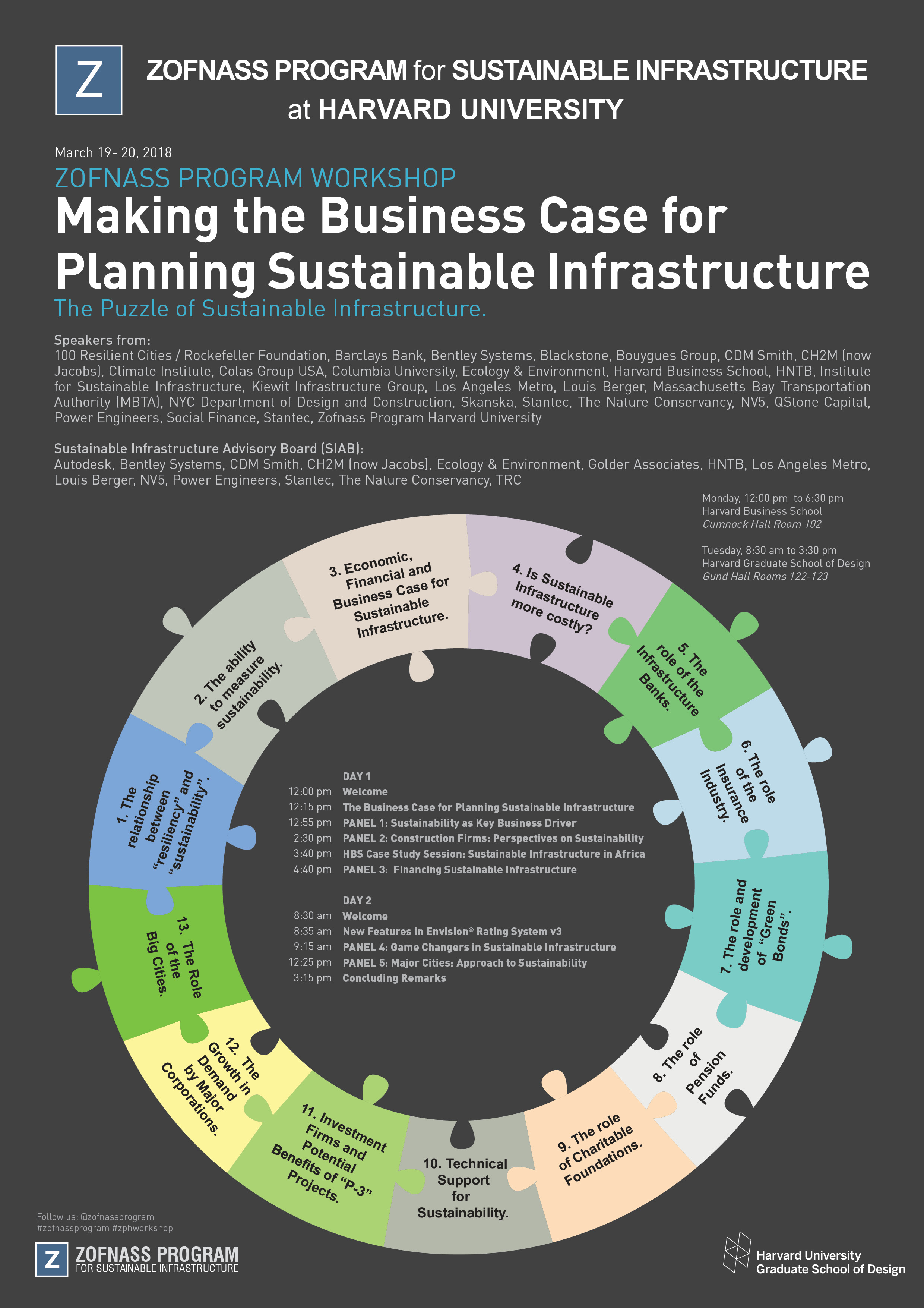
![]()
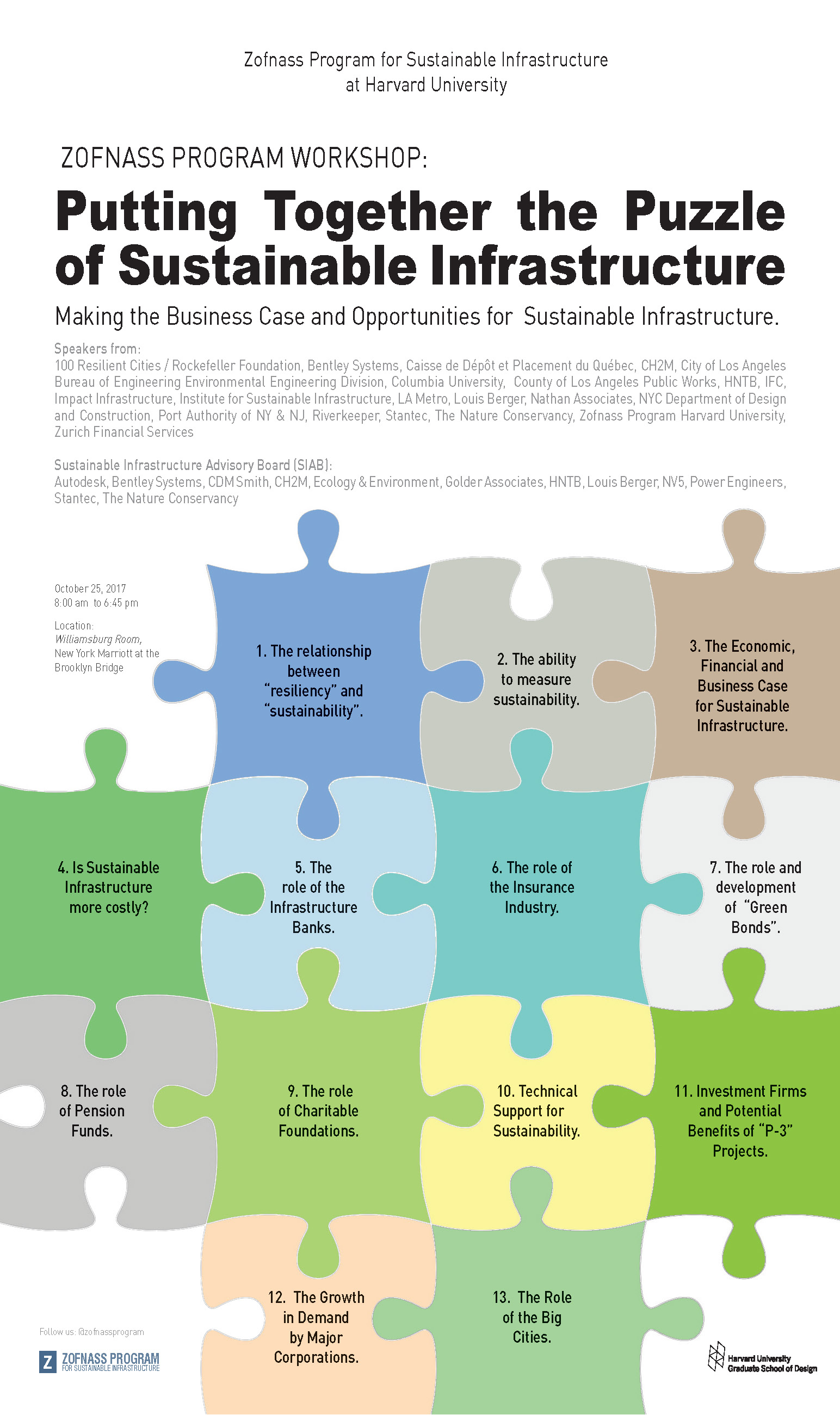
ZOFNASS PROGRAM at HARVARD UNIVERSITY WORKSHOP: PUTTING TOGETHER THE PUZZLE OF SUSTAINABLE INFRASTRUCTURE
October 25, 2017, 8:00 am to 6:00 pm
Location: Brooklyn Bridge Marriott, Brooklyn, NY
This one-day workshop is focused on identifying the key drivers for the future of sustainable infrastructure with special emphasis on the business case for sustainable infrastructure. It will be structured into several presentations and case studies followed by discussion.
The ZPHW will be composed of various presentations on the relationship between “resiliency” and “sustainability”; measuring sustainability with Envision; and the Business Case for Sustainable Infrastructure. Presentations will also focus on the roles of: Infrastructure Banks; Insurance Industry on sustainable infrastructure; “Green Bonds”; Pension Funds; Charitable Foundations and Organizations focused on the protection of the Environment and Nature; and Big Cities. In addition presentations will touch on the following topics: Technical Support for Sustainability; Investment Firms and Potential Benefits of “P-3” Projects; The Growth in Demand by Major Corporations to develop infrastructure sustainably.
![]()
ZOFNASS PROGRAM WORKSHOP: THE BUSINESS CASE FOR SUSTAINABLE INFRASTRUCTURE
April 3rd & 4th, 2017
Harvard Graduate School of Design and Harvard Business School
This Zofnass Workshop is dedicated to the discussion of the Business Case for Sustainable Infrastructure. The Zofnass Program for Sustainable Infrastructure considers critical to focus on the economic benefits of sustainable infrastructure. This workshop is geared as a platform to discuss the perspective of all relevant stakeholders involved in infrastructure about the Business Case for Sustainability and better understand opportunities for collaborative action when developing and operating new projects.
Decision-makers need to identify and understand the economic benefits of sustainability. The returns on sustainable investments represent an opportunity to contribute with applied research to this knowledge area, which is currently vague to stakeholders. It is widely known that sustainable projects avoid impacts, risks, costs and negative externalities, but these are rarely measured and shared with public officials and taxpayers. Understanding the types of costs, risks, and probability of risks allows stakeholders to deliver informed project designs that anticipate and withstand or adapt to these risks, minimizing their overall vulnerability. Through the Business Case for Sustainable Infrastructure, the Zofnass Program intends to articulate, in terms of productivity gains, how sustainable infrastructure contributes to social, business, and safety resilience. Illustrating the costs and vulnerabilities to hazards avoided through sustainable projects is the necessary first step for decision-makers to identify and understand the economic benefits of sustainability.
The Zofnass Program considers crucial to follow a multidisciplinary approach that considers the perspective of all stakeholders involved in infrastructure projects on the economic benefits of sustainable infrastructure. More often than not infrastructure projects are implemented through a heavily siloed approach, wherein there is no communication among different sectors. In addition, engineering is divided from finance and investment. Disparate training and research programs exist for each sector, which do not communicate with each other. Uncoordinated efforts in turn hamper collaboration and the implementation of best practices.
The main goal of this workshop is to provide a forum for all stakeholders to give perspectives on what is the value of sustainable infrastructure for them, what are the critical changes needed, and what would be the role of academia in the development of the Business Case for Sustainable Infrastructure. Each stakeholder group brings a unique perspective on how sustainability adds financial value and facilitates competitive returns. By combining each group’s unique decision-making processes and understanding of sustainability challenges, the workshop will shed light on how sustainable projects enhance competitiveness, resilience, and facilitate long-term economic growth.
![]()
PLANNING SUSTAINABLE CITIES CONFERENCE
November 3rd & 4th, 2016
Harvard Graduate School of Design
The Zofnass Program for Sustainable Infrastructure is pleased to host the Planning Sustainable Cities Conference. The conference aims to present an infrastructure-based approach to city planning, an analytical framework for urban sustainability, focusing on the services and performance of infrastructure systems. This conference will serve as the launch of the latest Zofnass Program publication ‘Planning Sustainable Cities. An Infrastructure-based Approach,’ directed and edited by Prof. Spiro Pollalis.
Infrastructure is understood as a series of systems that function in synergy, directly linked to urban planning. The conference aims to decode in different sessions the key infrastructure systems of Energy, Landscape, Transportation, Waste, Water, Information and Food, to explore their synergies through land use planning, engineering, economics and policy. The conference sessions are modeled according to the key infrastructure systems delineated in the Planning Sustainable Cities book.
This event will convene city planners, leaders in infrastructure development, designers, engineers, experts, academics, and public officials to share perspectives on sustainable city planning as well as to discuss the proposed infrastructure-based planning approach for sustainable cities.
More information on the Planning Sustainable Cities here
Download event poster here
![]()
SUSTAINABLE PLANNING: FOLLOWING DOXIADIS’S LEGACY
by Prof. Pollalis
November 1st, 2016, 6pm
The Harvard Mahindra Humanities Center and the Zofnass Program for Sustainable Infrastructure would like to invite you to the following seminar:
Mahindra Humanities Center, Harvard University
Seminar on Modern Greek Literature and Culture
Sustainable Planning: Following Doxiadis’s Legacy
Prof. Spiros Pollalis, Harvard University GSD
Tue., Nov. 1, 2016, 6 p.m.
Room S020, CGIS South, 1730 Cambridge Street, Cambridge, MA 02138
Abstract:
Constantinos Doxiadis’ Ekistics theory, the science dealing with human settlements and drawing on the research and experience of professionals in various fields, proposes an integrated approach, consistent with the contemporary notion of sustainability. Ekistics and its masterpiece application in planning Islamabad will be presented, leading to the most recent master planning of the Defense Housing Authority’s City Karachi, a city for 600,000 people under construction, and the master planning for the development of the former Athens airport.
![]()
HARVARD CHINA FUND ANNUAL SYMPOSIUM
May 17th and 18th, 2016
Harvard Center Shanghai
Building Leadership for Healthy Urban Sustainability
led by
Prof. Jack Spengler
Center for Health and the Global Environment
Harvard T.H. Chan School of Public Health
and
Prof. Spiro Pollalis
Zofnass Program for Sustainable Infrastructure
Harvard Graduate School of Design
This symposium is jointly organized by the Center for Health and the Global Environment at the Harvard T.H. Chan School of Public Health and the Zofnass Program for Sustainable Infrastructure at the Harvard Graduate School of Design with generous sponsorship from the Harvard China Fund.
The goal of this symposium is to build capacity in healthy urban sustainability by framing urban expansion as the opportunity for well-designed, spatially integrated development with sustainable urban infrastructure at its core. Sessions will showcase premier research, methodologies, and implementation of sustainable design and planning projects for healthy future cities, drawing on expertise from Harvard University and from research in China, as well as global leaders in sustainable infrastructure development. Input from symposium-goers will further expand upon the scope and possibilities for designing urban environments in China and other rapidly expanding regions. Attendees will hail from professional and academic fields of urban planning, architectural design, infrastructure development, public health, and government not just from within China, but also from elsewhere in Asia.
Download the detailed poster of the symposium in PDF format here.![]()
ZOFNASS LECTURE SERIES
May 11th, 2016 at 1pm
42 Kirkland st., Room 1A
Re-Learning Main Streets: Machine Learning Approach for Interpreting Urban Morphology
by Jie-Eun Hwang, Associate Professor at the University of Seoul, DDes 07′
For more information please click here.![]()
ZOFNASS PROGRAM WORKSHOP
April 4th and 5th, 2016
Harvard Graduate School of Design (Day 1) and Harvard Business School (Day 2)
Infrastructure Resilience II: Advancing Planning and Design Tools
This Zofnass Workshop continued our exploration of the intersection of Envision®, resilience, and infrastructure finance.
Day 1 at GSD (Gund Hall Room 112):
– Session 1: The Use of Envision® in Infrastructure Projects (Part I)
– Session 2: The Use of Envision® in Infrastructure Projects (Part II)
Day 2 at HBS (Cumnock Hall Room 102):
– Session 3: Application and Next Steps of the Zofnass Economic Process Tool
– HBS Case Study Session: Financing Resilience: Property & Casualty Insurance by J. Macomber
– Lunch Session: Tools Advancing Resilience
– Session 4: Climate Impact Adaptation Assessments and Planning
Download the poster of the workshop in PDF format here.![]()
ZOFNASS LECTURE SERIES
February 17th, 2016 at 1pm
Gund Hall 124
Improving Safety for Bicyclist and Pedestrians: Lessons from Boston and San Francisco
by Dahianna Lopez RN, MSN, MPH, PhD Candidate Harvard T.H. Chan School of Public Health
Learn about the strategy that the city of Boston is following for the prevention of injuries resulting from bicycle collisions, as well as the important role that urban design plays in creating a safer city.
For more information please click here.![]()
ZOFNASS PROGRAM SYMPOSIUM
November 2-3 , 2015
Infrastructure Resilience: Planning for Urban and Regional Resilience
This symposium focused on urban and regional resilience, as the next step of sustainable planning. It brought together public officials, infrastructure engineers, planners, design professionals and academics to share next generation perspectives on urban resilience, focusing on infrastructure planning at the urban and regional scales.
For more information please click here.![]()
ZOFNASS LECTURE SERIES
October 23, 2015 at 12pm
42 Kirkland Room 1G
Civic Technology + Urban Planning: The State of the Landscape
by Cristina Garmendia, HKS MPP ’12
Learn about the current state of the civic technology and its influence on urban planning, and future opportunities for open data and digital engagement to change the shape of our cities.![]()
ZOFNASS PROGRAM SYMPOSIUM
February 26-27, 2015
Water Infrastructure: Next Generation Planning Perspectives on Urban Water Management
Download the full program of the symposium in PDF format here.![]()
ZOFNASS WORKSHOP ON COLLABORATIVE PLATFORMS FOR INFRASTRUCTURE PLANNING
October 27-28, 2014
Energy Infrastructure: Next Generation Planning Perspectives
This symposium was a collaborative platform that brought forward thinking minds of public officials, infrastructure engineers, planners and design professionals and academia to share “next generation” perspectives on sustainable Energy Infrastructure. The Zofnass methodology and application examples on Energy Infrastructure Planning was also presented as a prospective framework for integrative planning and collaboration.
Please click here for more information on the topic and the agenda. Download the full program of the symposium in PDF format here.![]()
ZOFNASS SIAB WORKSHOP
May 19-20, 2014
This workshop covered topics on Zofnass Economic Process Tool, IDB Infrastructure 360° Awards, Zofnass Planning Cities through an infrastructure based approach, and Introduction of Next Generation Infrastructure Research (Surdna Foundation Grant).![]()
SIAB MEETING: REVIEW OF CURRENT RESEARCH
January 23-24, 2014
The meeting with SIAB members took place at Harvard Business School. The agenda concerned the detailed review of Zofnass Economic Process tool online version and the detail review of Zofnass Infrastructure Planning Guidelines & Publication.![]()
ZOFNASS WORKSHOP
September 16-17, 2013
Zofnass Sustainable Planning Guidelines workshop & Envision metrics working group meeting.
![]()
HOW FOOD SYSTEMS SAPE CITIES: ECOLOGICAL AND ECONOMIC PERSPECTIVES
May 2, 2012
This inaugural event took an in-depth look at the ecological and economic issues of food systems in the urban built environment, from the micro to the bioregional scale. Agriculture and food systems represent a potent force for shaping city infrastructure, improving public health, feeding growing populations, rebuilding communities, reconnecting people to nature, restoring degraded environments, and revitalizing economies.
![]()
A ROAD MAP TO SUSTAINABLE INFRASTRUCTURE & GREEN CITIES CONFERENCE
September 14 – 16, 2011
Measuring impacts on the environmental, social, and economic aspects of our cities and infrastructures is only a first, albeit essential, step towards a sustainable future. With limitless moving parts, and many stakeholders with varying degrees of interest, incentives, and motivation, making a compelling case for sustainable infrastructure projects requires a clear and well-structured road map.
![]()
THE ZOFNASS PROGRAM FOR SUSTAINABLE INFRASTRUCTURE AND THE ISI SIGN LETTER OF INTENT
June 22, 2011
Envision™ is the product of a strategic alliance and collaboration of several organizations including the Institute for Sustainable Infrastructure (ISI), a nonprofit organization co-founded by the American Public Works Association, the American Society of Civil Engineers and the American Council of Engineering Companies, and the Zofnass Program for Sustainable Infrastructure at the Harvard University Graduate School of Design.
![]()
WORKSHOP: SUSTAINABLE INFRASTRUCTURE: WHO PAYS & WHO BENEFITS?
April 21, 2011
This workshop took place at Harvard University’s Graduate School of Design. Areas of discussion focused on the balance between socio-economic and environmental priorities in large scale infrastructure projects and how to evaluate and communicate the costs and benefits of sustainable infrastructure development.
![]()
INFRASTRUCTURE SUSTAINABILITY AND DESIGN CONFERENCE
April 21 – 23, 2010
The conference will identify many challenges of sustainability, including the need for infrastructure rehabilitation in developed countries. Through the introduction of the Zofnass Rating System, sustainability metrics will be discussed as well as the branding of sustainability through the adoption of certification and rating systems. Industry experts will address the specific challenges of sustainability for infrastructure projects of varying types.


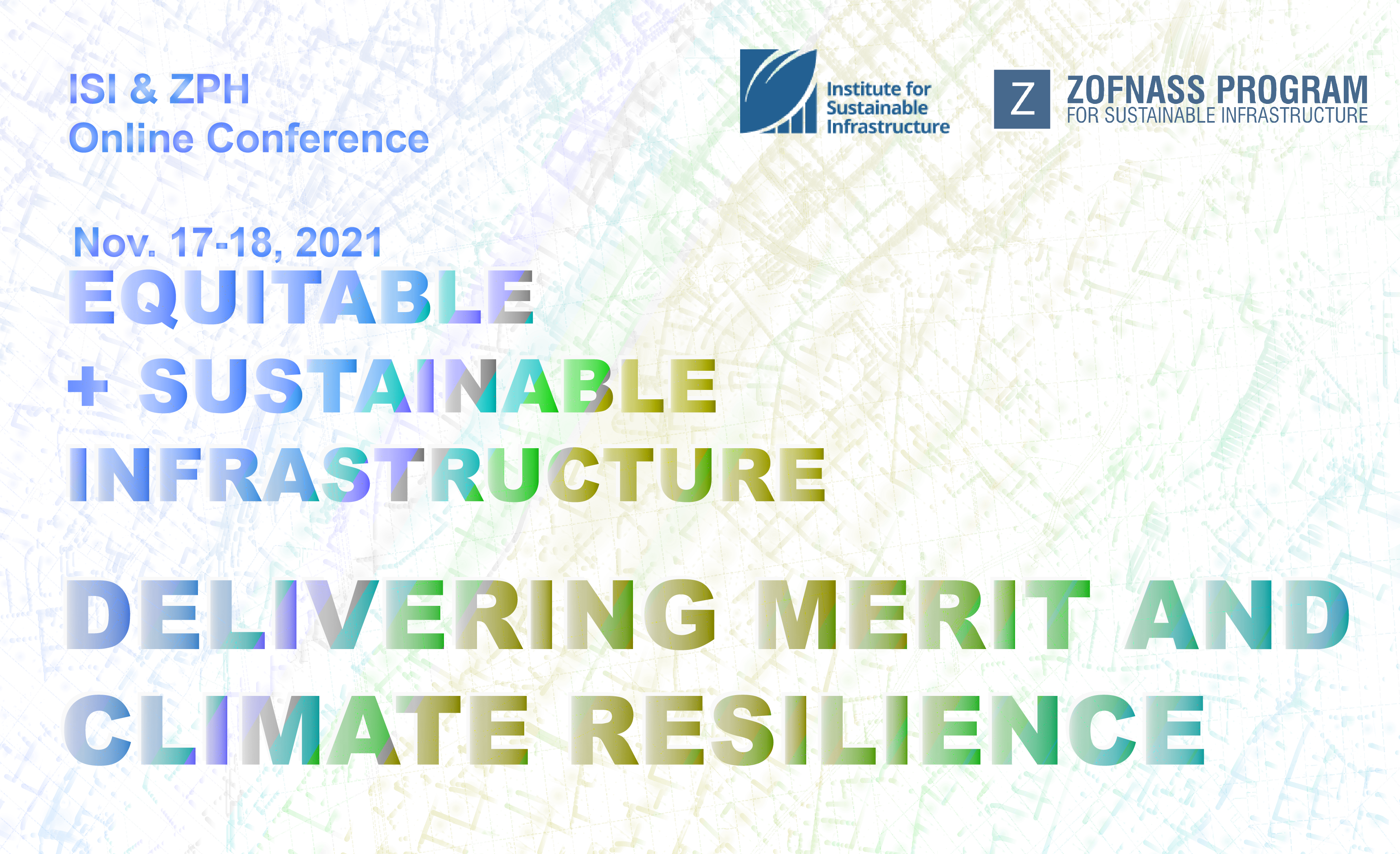

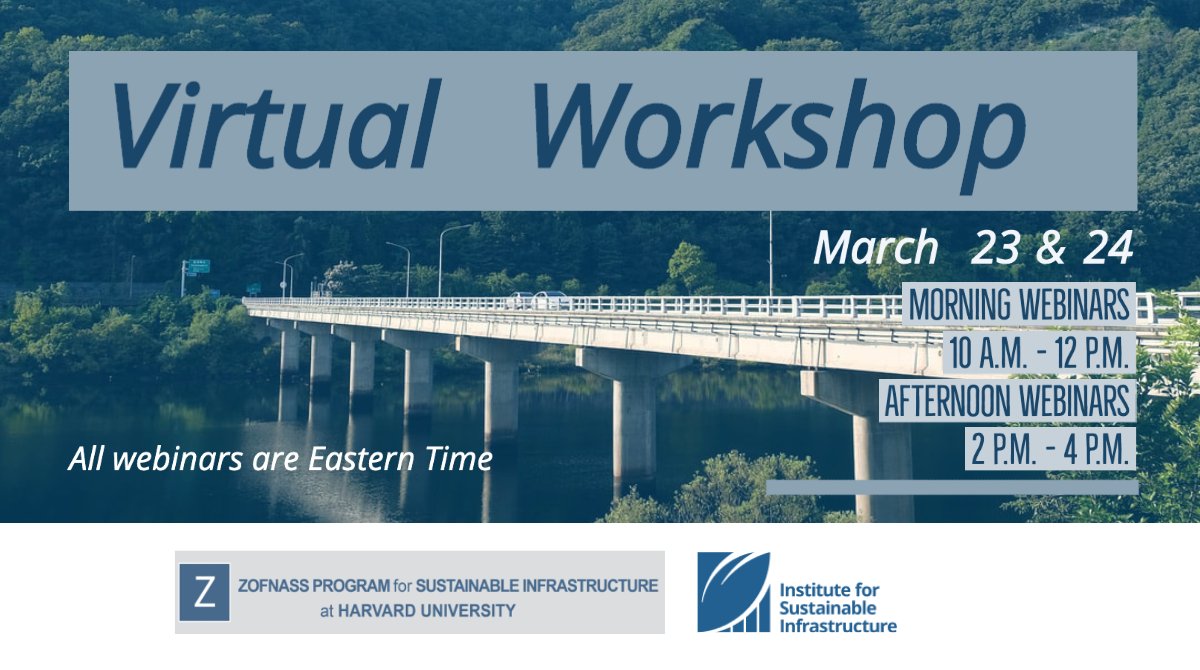
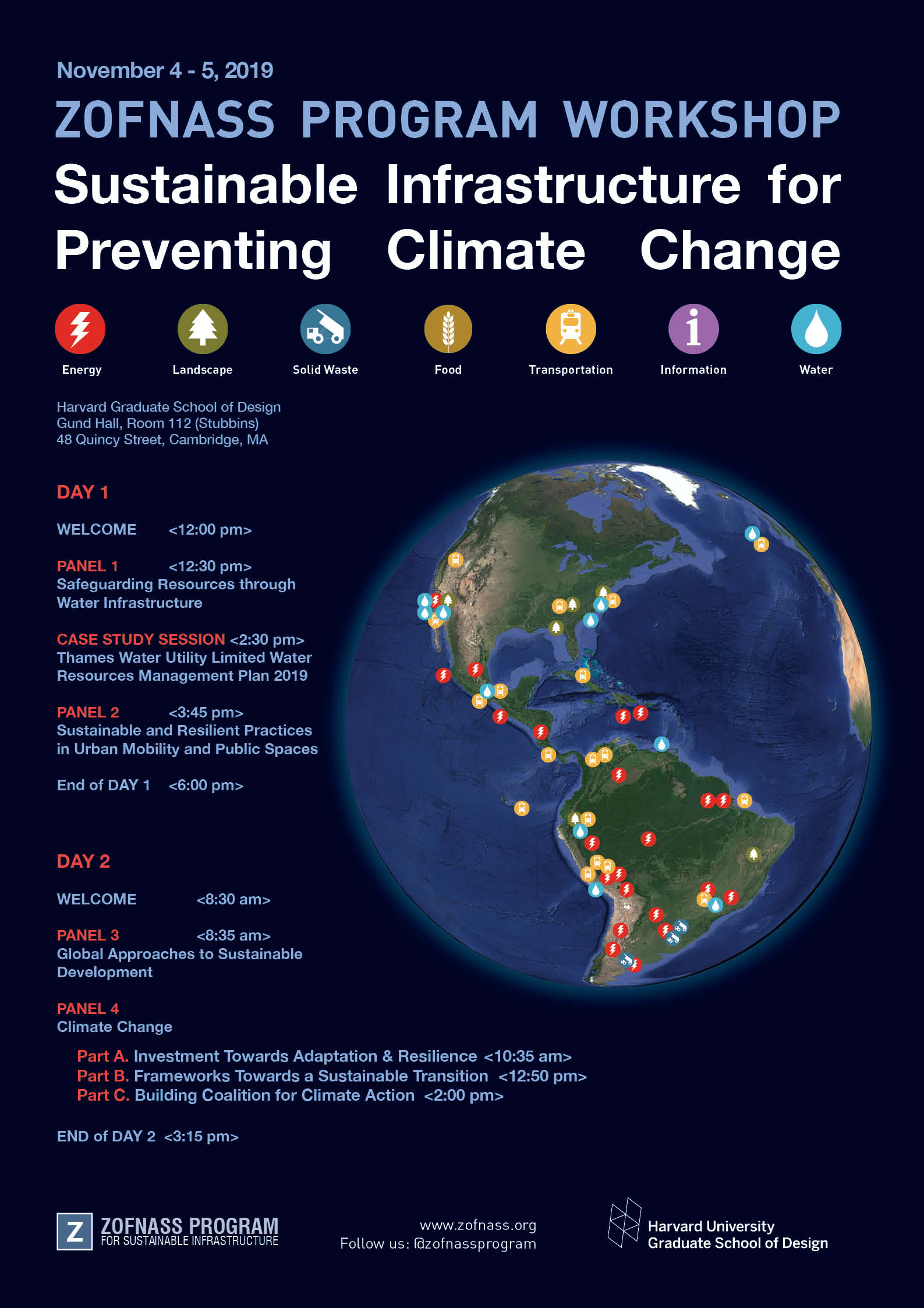


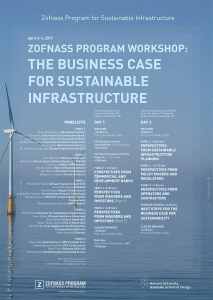
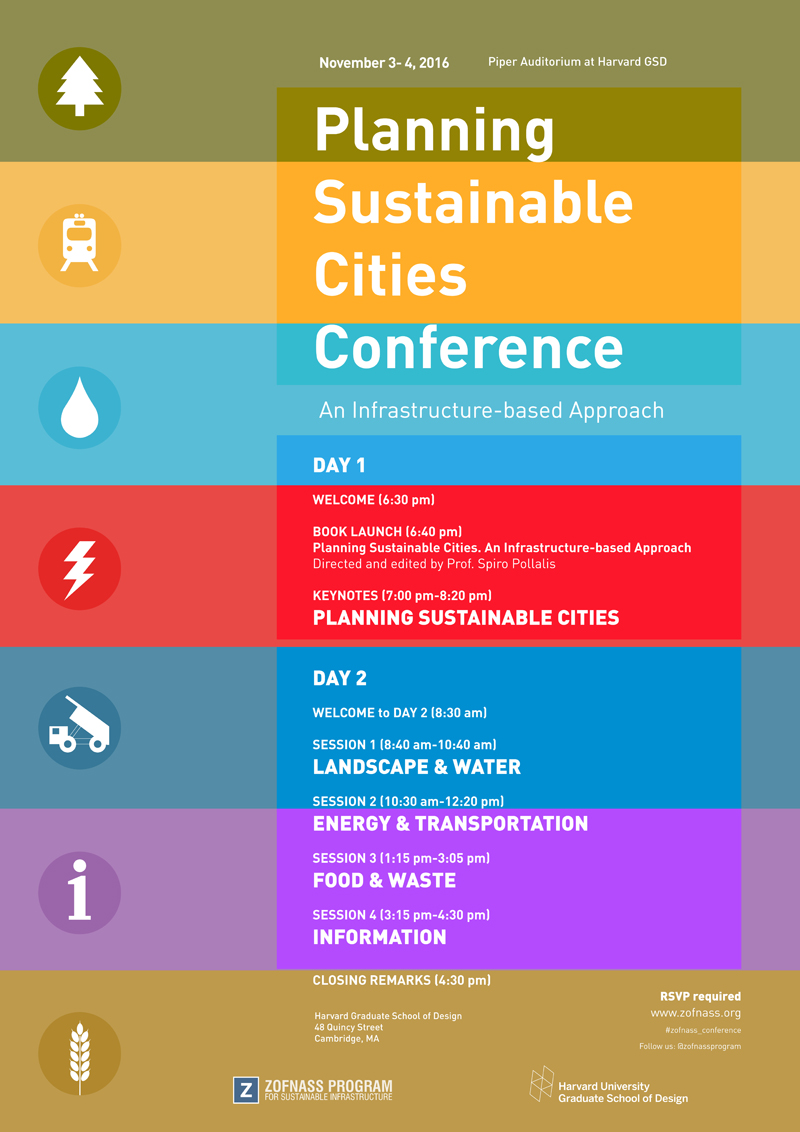

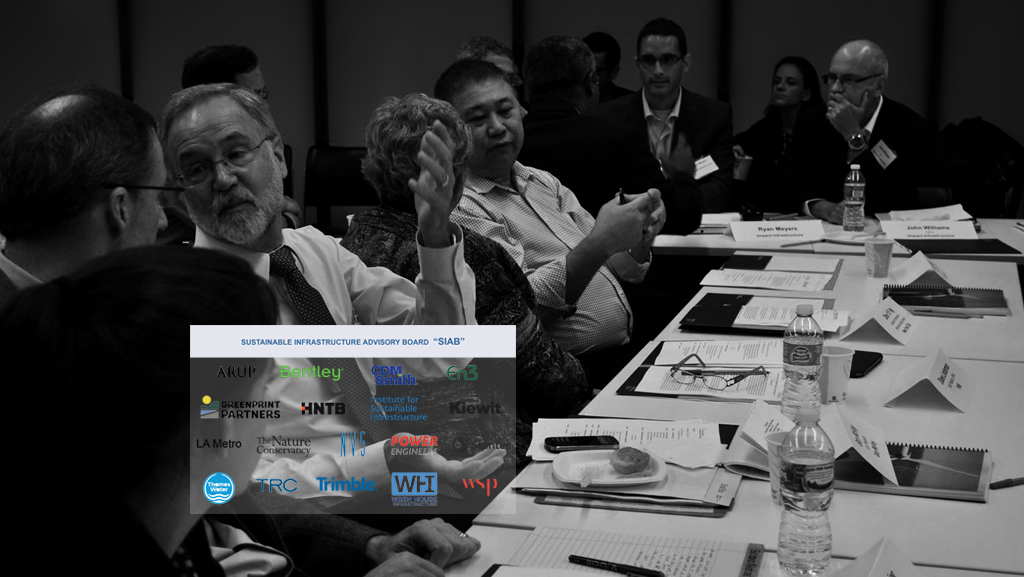
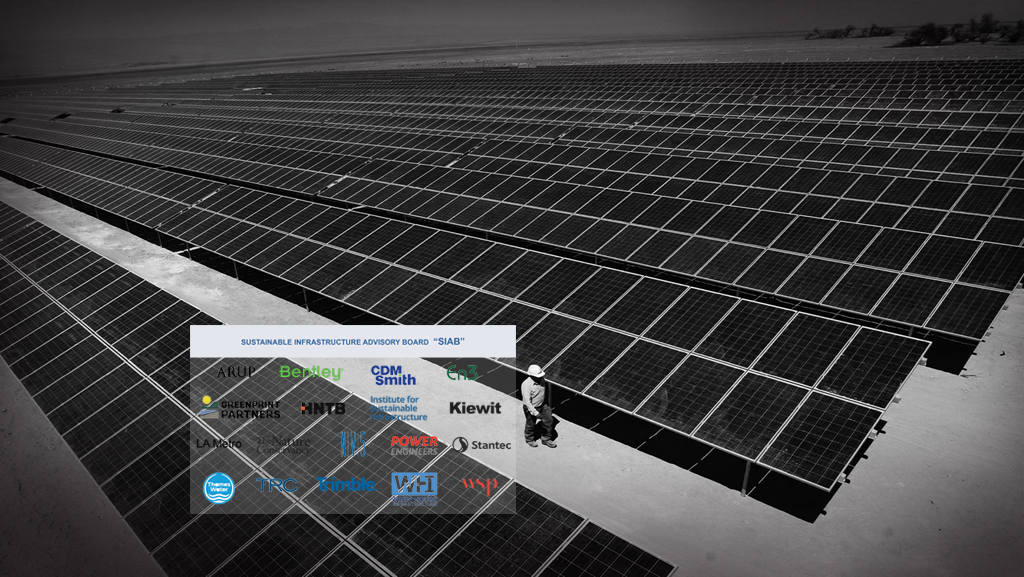
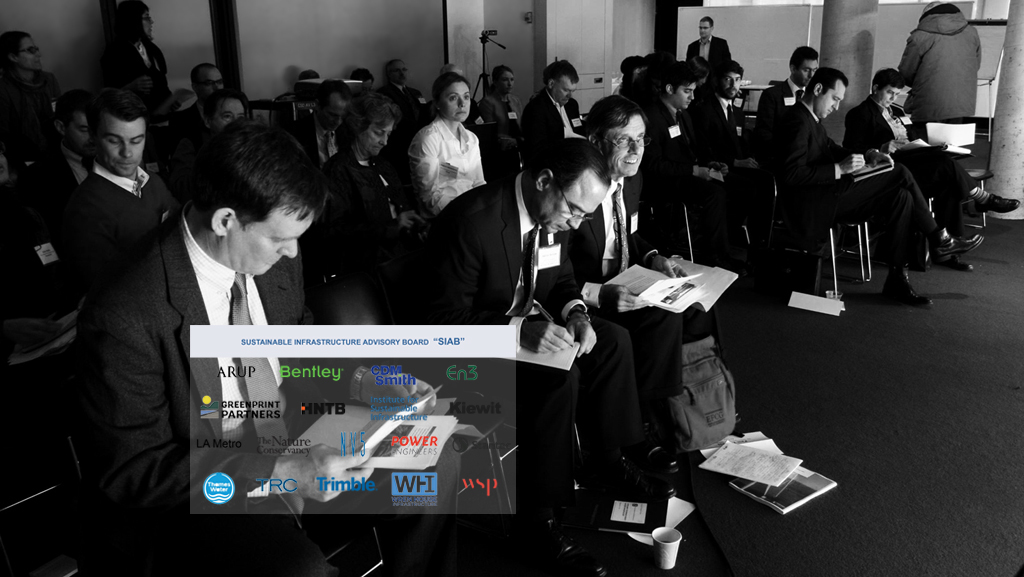
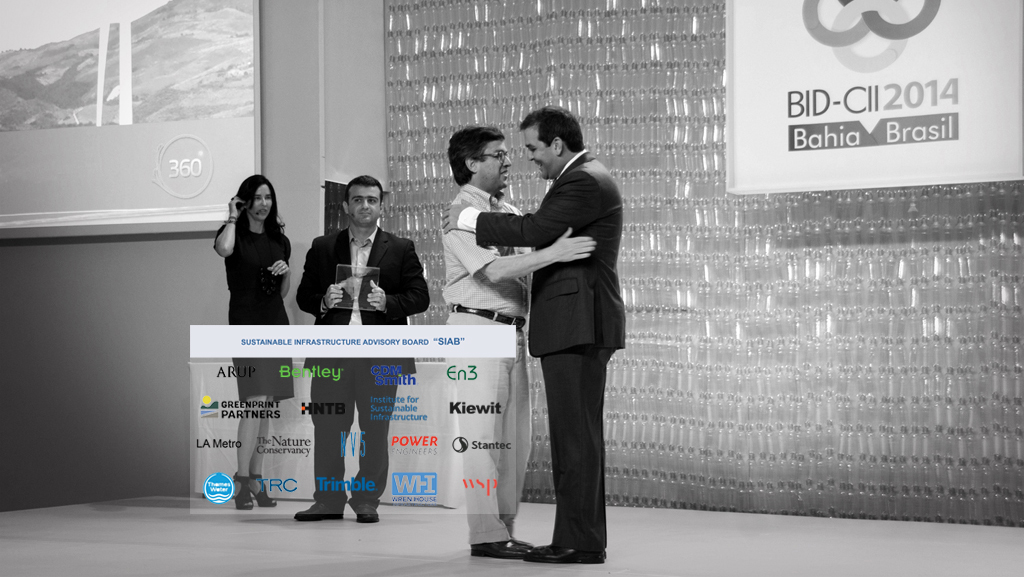
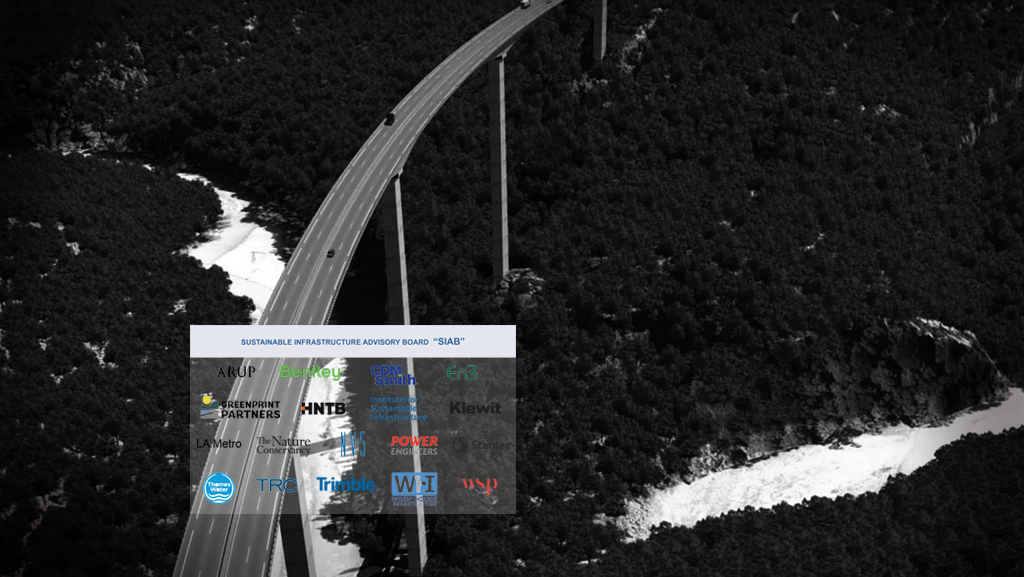
Join us now ZPH Workshop: #Sustainable #Infrastructure for #ClimateAction in-person & ZOOM https://t.co/fCjkr0Ykrh
About 2 years ago from Zofnass Program's Twitter